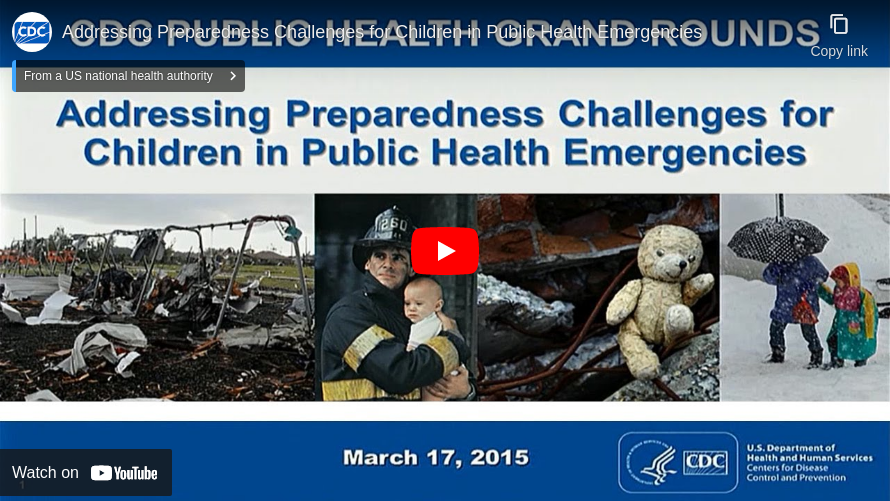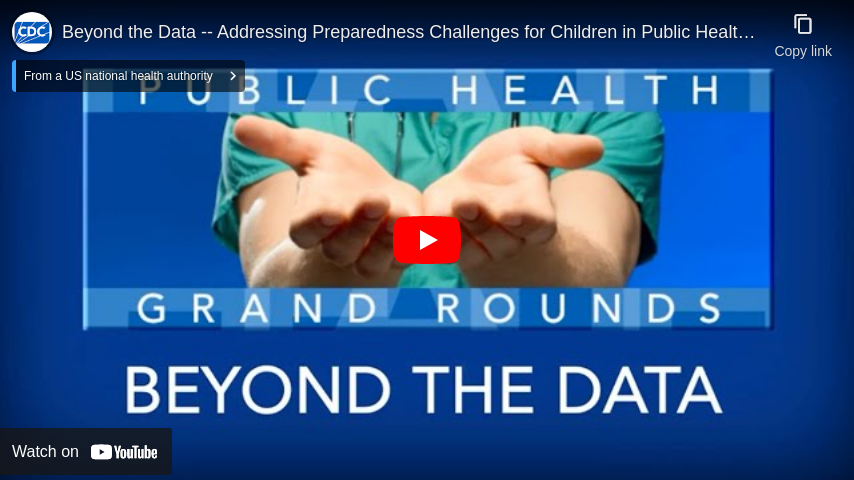Addressing Preparedness Challenges for Children in Public Health Emergencies
Presented on .
Public health emergencies can happen at any time, anywhere. Natural disasters, epidemics, and terrorist attacks that have occurred in recent years have underscored the importance of local, state, and federal public health systems in preparing for potential health threats. Public health emergencies, such as Hurricane Katrina, the 2009 H1N1 influenza pandemic, and 9/11 have shown that children have different needs than adults, and require special attention, such as pediatric-focused care. However, responses to past events also show that the unique needs of children have not been adequately addressed in the planning process.
Incorporating the needs of children into emergency preparedness planning is critical. A child’s age and size may require the use of different medications or equipment for medical care, but availability of these pediatric resources is often limited. Clinicians accustomed to performing certain procedures on adults often do not feel comfortable performing these same procedures on a child – posing dilemmas for individual responders during times of emergency.
This session of Grand Rounds will discuss strategies to address the unique vulnerabilities of children in every stage of emergency planning. Presenters will also highlight the strong progress that has been made in pediatric disaster readiness as well as the collaboration that is still needed between public health professionals and pediatric care providers to improve the outcomes for children during emergencies.
Dr. Phoebe Thorpe and Dr. Georgina Peacock discuss ways in which we can better provide for the needs of children during public health disasters. We have made great strides over the years but there is always more work to do.
Public health systems must:
- Ensure medications and equipment for children are readily available
- Continue to provide recommendations to help everyone prepare for disasters
Families need to:
- Have extra medication and supplies on hand in case of evacuation
- Identify alternative power options for medical equipment in the event there is a power outage
Health professionals can
- Participate in disaster drills to identify ways in which they can provide assistance
- Use available resources to educate families on planning for emergencies
- Georgina Peacock, MD, MPH
- Director, Division of Human Development and Disability
National Center on Birth Defects and Developmental Disabilities, CDC
- Michael R. Anderson, MD, MBA
- Chief Medical Officer
University Hospitals
- Esther Chernak, MD, MPH
- Director, Center for Public Health Readiness and Communication
Associate Research Professor,
Department of Environmental and Occupational Health
Drexel University School of Public Health
- RADM Nicole Lurie, MD, MSPH
- Assistant Secretary for Preparedness and Response
U.S. Department of Health and Human Services
- John Iskander, MD, MPH
- Scientific Director
- Phoebe Thorpe, MD, MPH
- Deputy Scientific Director
- Susan Laird, MSN, RN
- Communications Director
Get notified about the latest updates from Public Health Grand Rounds right in your inbox by setting up an alert today!
Get notified about the latest updates from Public Health Grand Rounds right in your inbox by setting up an alert today!Sign Up
Get notified about the latest updates from Public Health Grand Rounds right in your inbox by setting up an alert today!



